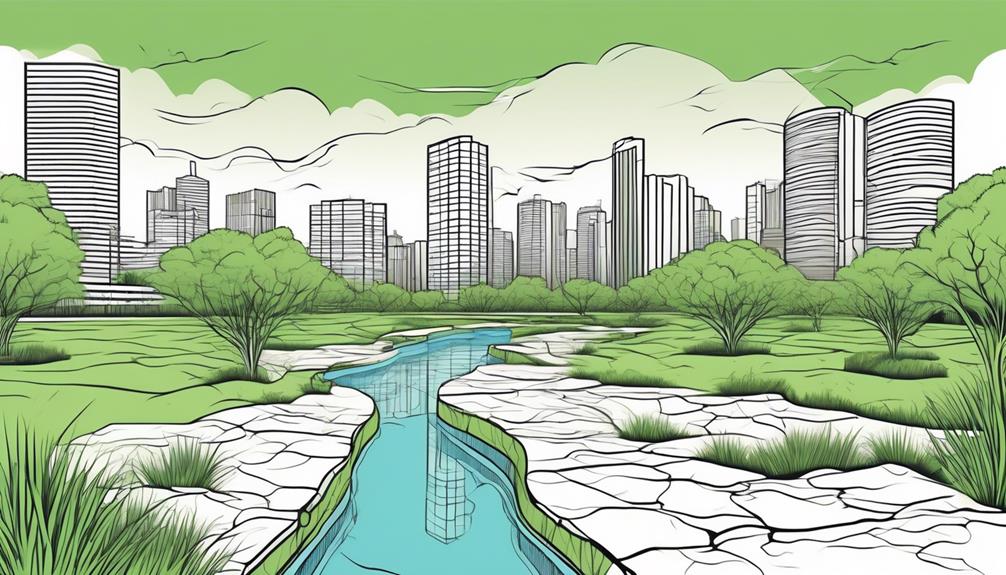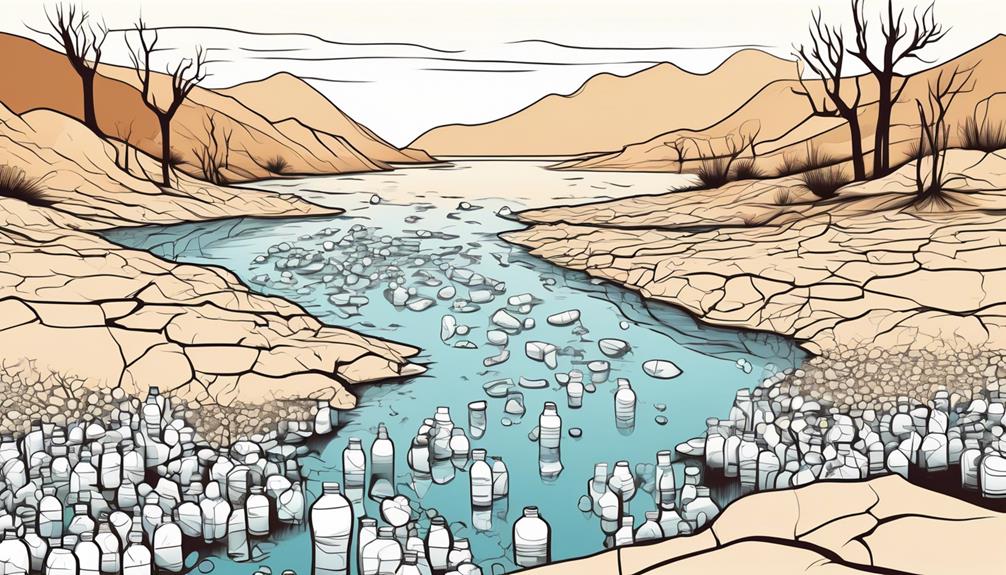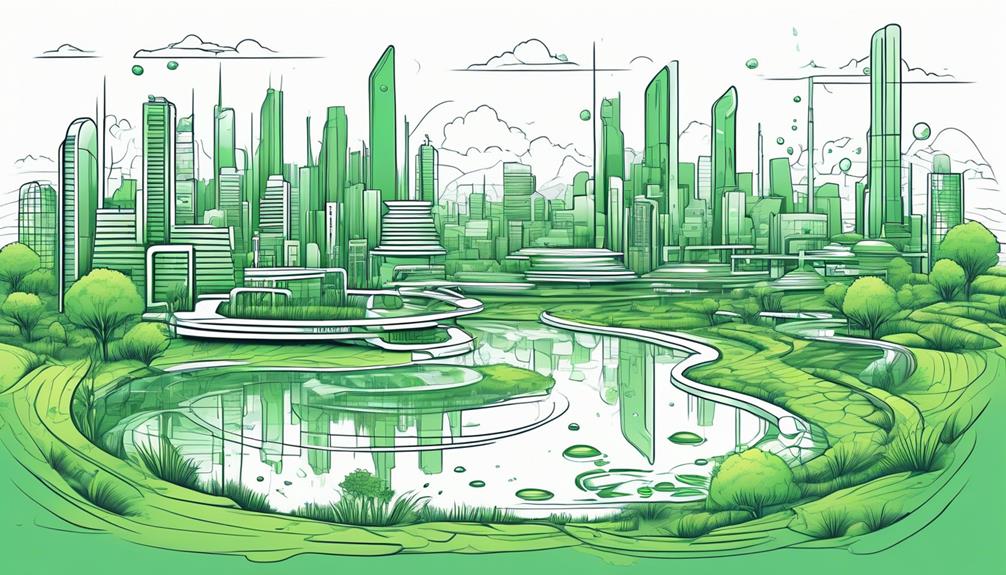Imagine a world where rivers run dry, and parched lands stretch as far as the eye can see. Water, the essence of life, slipping through our fingers like sand. In the face of such a haunting possibility, water conservation laws stand as the guardians of our most precious resource.
But why are these laws so essential, you might wonder? Let's delve into the intricate web of reasons that make water conservation laws not just important, but imperative for our very existence.
Key Takeaways
- Government regulations play a crucial role in preventing water wastage and contamination through effective monitoring and enforcement.
- Compliance enforcement methods, such as regular inspections and fines, are essential for ensuring adherence to water conservation laws and promoting sustainable water usage practices.
- Legal frameworks and international agreements on water conservation help hold individuals and organizations accountable for environmental harm, promote consistency in conservation efforts, and prioritize resource conservation for future generations.
- Public awareness and education on water conservation are vital for driving behavior change towards water-saving habits, fostering community engagement, and shaping long-term economic stability through cost savings and job creation in water-saving sectors.
Impact of Water Scarcity
Experiencing water scarcity can profoundly impact communities, ecosystems, and economies worldwide. When water becomes scarce, communities face challenges accessing clean water for drinking, sanitation, and hygiene. This can lead to health issues, particularly affecting vulnerable populations like children and the elderly. Inadequate water supply also hinders agriculture, reducing crop yields and food security. Ecosystems suffer as well, with aquatic habitats dwindling and biodiversity declining. The scarcity of water disrupts the balance of nature, affecting plants, animals, and overall ecosystem health.
Furthermore, economies can be severely affected by water scarcity. Industries that rely heavily on water, such as agriculture, manufacturing, and tourism, may struggle to operate efficiently. This can lead to job losses, decreased productivity, and economic instability. Additionally, water scarcity can spark conflicts over resources, further straining communities and nations.
Addressing water scarcity through conservation measures is crucial to mitigate these impacts and ensure a sustainable future for all.
Role of Government Regulations
Now let's talk about the essential role that government regulations play in water conservation.
You'll discover why government oversight is crucial and how enforcement methods ensure compliance with water conservation laws.
Understanding these key points will shed light on the significant impact of regulatory actions in preserving our water resources.
Government Oversight Importance
Government regulations play a crucial role in ensuring effective water conservation practices are implemented and enforced. By overseeing water usage through laws and policies, the government can monitor and control activities that may lead to water wastage or contamination. Through permits, restrictions, and monitoring systems, authorities can ensure that industries, agriculture, and individuals adhere to sustainable water practices.
Government oversight helps prevent over-extraction of water sources, pollution, and inefficient water use. Without these regulations, there would be a higher risk of water scarcity, environmental degradation, and public health issues. By enforcing compliance with water conservation laws, the government plays a key role in safeguarding water resources for current and future generations.
Compliance Enforcement Methods
Transitioning from the importance of government oversight in water conservation, ensuring compliance with regulations is vital for effective water management and preservation of resources.
Government regulations play a crucial role in monitoring and enforcing water conservation laws to guarantee that individuals, businesses, and industries adhere to specified guidelines. Compliance enforcement methods include regular inspections, issuing fines for violations, and implementing incentive programs to encourage sustainable water usage practices.
Importance of Conservation Policies
Conservation policies play a crucial role in safeguarding our environment for future generations by regulating resource usage and promoting sustainable practices. These policies are vital in ensuring that our natural resources are preserved and utilized responsibly. Let's look at a table below to understand the key reasons why conservation policies are of utmost importance:
| Importance of Conservation Policies | Explanation |
|---|---|
| Preserving Ecosystems | Conservation policies help protect habitats and biodiversity, ensuring a balanced ecosystem. |
| Sustainable Resource Management | By regulating resource usage, policies promote long-term sustainability and reduce environmental degradation. |
| Mitigating Climate Change | Policies that promote sustainable practices can help reduce carbon emissions and combat climate change effectively. |
Benefits of Legal Frameworks
How do legal frameworks contribute to the protection of our environment and natural resources?
Legal frameworks play a crucial role in safeguarding our natural resources and environment by setting clear guidelines and regulations. Here are three key ways in which legal frameworks benefit conservation efforts:
- Enforcement: Legal frameworks provide the necessary tools to enforce conservation laws and hold individuals or organizations accountable for any harm caused to the environment. By establishing penalties for non-compliance, these laws deter activities that could lead to environmental degradation.
- Consistency: Having a legal framework ensures consistency in conservation efforts across different regions or sectors. It helps in standardizing practices and promoting a unified approach towards protecting our water resources and ecosystems.
- Long-Term Sustainability: Legal frameworks promote sustainable management of natural resources by outlining strategies for long-term conservation. By legally mandating practices that prioritize resource conservation, these frameworks help ensure the well-being of our environment for future generations.
Challenges in Enforcement

To effectively protect our environment and natural resources, addressing the challenges in enforcement of water conservation laws is crucial. Enforcement poses several hurdles, such as limited resources for monitoring compliance, making it difficult to ensure widespread adherence. In some cases, the lack of clear guidelines or standardized penalties hampers effective enforcement efforts, leading to inconsistent application of the laws. Moreover, the complexity of water systems and varying state regulations can create confusion and hinder enforcement across different regions.
Another significant challenge is the resistance or lack of cooperation from individuals or industries reluctant to change their water usage habits. This defiance can undermine enforcement efforts and weaken the overall impact of conservation laws. Additionally, legal loopholes or inadequate penalties for violators can diminish the deterrent effect of the regulations, making it easier for offenders to escape accountability.
Addressing these enforcement challenges requires improved coordination between regulatory bodies, increased public awareness, and stronger penalties for non-compliance. By tackling these obstacles head-on, we can strengthen the enforcement of water conservation laws and better safeguard our precious water resources for future generations.
Global Water Conservation Efforts
When it comes to global water conservation efforts, international water treaties play a crucial role in managing shared water resources.
Sustainable urban planning is also key in ensuring efficient water usage and reducing wastage.
International Water Treaties
International Water Treaties play a crucial role in fostering global cooperation and sustainability in water conservation efforts. These treaties help countries work together to manage shared water resources efficiently and equitably. Here's why they're essential:
- Promote Collaboration: International water treaties encourage countries to collaborate on transboundary water issues, promoting peaceful resolutions and mutual benefits.
- Ensure Equitable Resource Allocation: By outlining clear guidelines for sharing water resources, these treaties help prevent conflicts over water usage and ensure fair distribution.
- Support Environmental Protection: International agreements often include provisions for protecting water ecosystems, promoting biodiversity, and mitigating pollution on a global scale.
Sustainable Urban Planning
Global water conservation efforts are intricately linked to sustainable urban planning, ensuring efficient resource management and environmental protection on a large scale.
By integrating water-saving technologies, promoting green spaces, and implementing water reuse systems in cities, sustainable urban planning plays a crucial role in preserving water resources for future generations.
Through strategic zoning regulations and infrastructure development, cities can minimize water waste, reduce pollution, and enhance overall resilience to water scarcity issues.
Sustainable urban planning not only benefits the environment but also creates healthier and more livable communities.
Embracing sustainable practices in urban development is key to meeting the growing water demands of expanding populations while safeguarding the planet's limited water supply for years to come.
Economic Implications of Laws

Water conservation laws have direct and indirect impacts on the economy that are crucial to understand. These laws not only help in preserving water resources but also play a significant role in shaping economic activities. Here's how water conservation laws can influence the economy:
- Cost Savings: Implementing water conservation measures can lead to reduced water usage, resulting in lower water bills for households, businesses, and industries. This reduction in costs can translate into savings that can be utilized for other economic activities.
- Job Creation: The enforcement of water conservation laws often stimulates the development of new technologies and industries focused on water-saving solutions. This can create job opportunities in sectors such as water-efficient product manufacturing, water management services, and sustainable agriculture.
- Long-Term Economic Stability: By safeguarding water resources through conservation laws, economies can mitigate the risks associated with water scarcity. Ensuring a reliable water supply can support various sectors like agriculture, tourism, and manufacturing, contributing to overall economic stability and growth.
Public Awareness and Education
You must understand the significance of raising awareness about water conservation.
Educational campaigns have a powerful impact on society by informing individuals of sustainable practices.
Importance of Awareness
To understand the importance of water conservation laws, it's crucial for the general public to be informed and educated about the impact of their water usage on the environment and future generations. Here are three key reasons why awareness plays a vital role in promoting water conservation:
- Behavior Change: Awareness raises consciousness about water scarcity and encourages individuals to adopt water-saving habits.
- Community Engagement: Educated communities are more likely to work together towards sustainable water management practices.
- Policy Support: Public awareness creates a supportive environment for the implementation and enforcement of water conservation laws.
Educational Campaigns Impact
Engaging educational campaigns play a pivotal role in raising public awareness and promoting understanding about the importance of water conservation laws. These campaigns utilize various channels to inform individuals about the significance of conserving water resources for future generations. Through interactive workshops, social media initiatives, school programs, and community events, people like you can learn about practical ways to reduce water wastage and contribute to a sustainable environment. By actively participating in these educational efforts, you not only enhance your knowledge but also become an advocate for responsible water usage within your community. Check out the table below for a quick overview of the impact of educational campaigns on water conservation:
| Educational Campaign Impact | Description |
|---|---|
| Increased Awareness | Enhances public understanding of water conservation |
| Behavior Change | Encourages individuals to adopt water-saving practices |
| Community Engagement | Fosters a sense of collective responsibility |
| Policy Support | Strengthens advocacy for water conservation laws |
Behavioral Change Promotion
Building on the impact of educational campaigns, behavioral change promotion through public awareness and education is essential for instigating tangible shifts in water conservation practices.
To effectively promote behavioral change in water conservation, consider the following:
- Education: Provide clear and accessible information on water conservation practices and their impact on the environment.
- Incentives: Offer rewards or incentives for individuals or communities that demonstrate significant efforts in water conservation.
- Community Engagement: Encourage community involvement through workshops, events, and online platforms to foster a sense of collective responsibility towards water conservation.
Sustainable Water Management Practices
Considering the importance of sustainable water management practices, it's crucial to implement efficient strategies to ensure the long-term availability and quality of water resources. Sustainable water management involves using water resources wisely to meet current needs without compromising the ability of future generations to access clean water. One key practice is promoting water reuse and recycling, which can help reduce the strain on freshwater sources. Implementing efficient irrigation techniques, such as drip irrigation, can also significantly decrease water wastage in agriculture.
Furthermore, managing urban development to prevent pollution of water sources is vital for maintaining water quality. This includes properly treating wastewater before releasing it back into the environment. Conserving water at the household level through simple actions like fixing leaks and using water-saving appliances is another essential aspect of sustainable water management. By adopting these practices, individuals can contribute to the preservation of water resources for a sustainable future.
Future of Water Legislation

Efficient water legislation plays a crucial role in shaping the future of sustainable water management practices. As we look ahead, the future of water legislation holds the key to ensuring water security for generations to come.
Here are three key aspects that highlight the significance of future water legislation:
- Technology Integration: Embracing innovative technologies like smart water meters and real-time monitoring systems can revolutionize how we manage water resources efficiently. These technologies can help in identifying leaks, optimizing water usage, and promoting conservation efforts.
- Policy Development: Implementing robust policies that prioritize water conservation, sustainable usage, and responsible management is essential. Strong policies can set the foundation for effective water governance, ensuring that water resources are utilized wisely and protected for the future.
- Community Engagement: Encouraging public participation and raising awareness about the importance of water conservation can drive positive change. Engaging communities in water conservation efforts can foster a culture of responsibility towards water resources and promote collective action for a sustainable future.
Frequently Asked Questions
How Do Water Conservation Laws Differ Between Developed and Developing Countries?
In developed countries, water conservation laws are usually more established and regulated, focusing on advanced technologies and efficient usage. Developing nations often face challenges in enforcement and infrastructure, leading to less stringent measures.
What Are Some Innovative Technologies Being Used to Enforce Water Conservation Laws?
To enforce water conservation laws, authorities in many places use innovative technologies like smart meters, satellite imagery, and leak detection systems. These tools help track usage, identify inefficiencies, and ensure compliance with regulations.
How Do Water Conservation Laws Impact Indigenous Communities and Their Access to Water Resources?
Water conservation laws directly affect indigenous communities, shaping their access to vital water resources. By enforcing these regulations, authorities can safeguard water supplies for all, ensuring equity and sustainability while respecting cultural and environmental needs.
Are There Any Specific Water Conservation Laws That Target Agriculture and Industrial Water Usage?
In the realm of water conservation laws, some specifically aim to rein in water usage by agriculture and industry. These measures act as guardians, guiding the flow of water resources towards a sustainable future.
How Do Water Conservation Laws Intersect With Climate Change Adaptation Strategies at a Global Level?
Water conservation laws intersect with global climate change adaptation strategies by regulating water usage, promoting efficient practices, and safeguarding water resources. Complying with these laws helps mitigate water scarcity, protect ecosystems, and enhance sustainability worldwide.
Conclusion
Imagine a world where a river flows freely, its waters abundant and clear. Water conservation laws are the dam that holds back the tide of scarcity, protecting our precious resource.
Without these crucial regulations, our rivers would run dry, leaving us parched and desperate.
So remember, the next time you turn off the faucet or report a water leak, you're playing a vital role in ensuring a sustainable future for all. Thank you for being a water warrior.